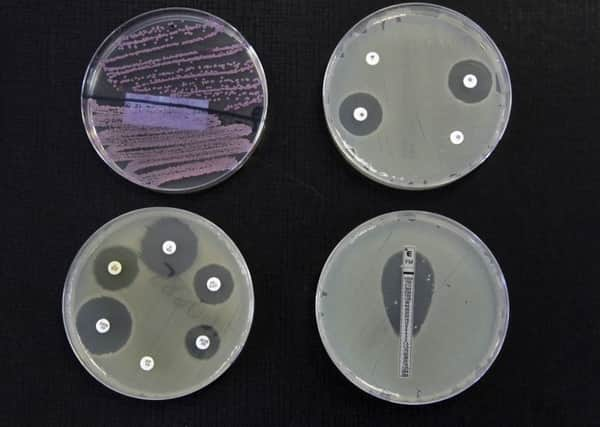Resistance to antibiotics ‘can be passed from cats and dogs to humans’ research finds


Hygiene warnings have been issued after scientists found a gene which leads to antimicrobial resistance to infections including streptococci and MRSA in bacteria from cats and dogs.
The discovery at an unnamed animal hospital is the first of its kind in the UK and means pet owners should make sure they wash their hands after handling and cleaning up after their animals, said Public Health England (PHE). The gene, known as optrA, is known to enable bacteria to become highly resistant to linezolid, a “last resort” antibiotic licensed for used to treat infections in humans.
Advertisement
Hide AdAdvertisement
Hide AdThe research found that the gene can spread between different bacteria including staphylococcus aureus, the bug which causes MRSA.
PHE said no humans were found to have become ill from the pet bacteria. PHE’s Dr Katie Hopkins, who led the research, said: “This is concerning as transmission of this organism to owners carries the potential for spread to other bacteria, including staphylococcus aureus.
“This may lead to difficult-to-treat infections. In order to minimise transmission of resistant bacteria between companion animals and people veterinary surgeries need to ensure adequate cleaning takes place and pet owners should wash their hands after handling pets.”
Dr Hopkins said the prevalence of the antibiotic-resistant bacteria in pets is unknown and further monitoring is needed.
Advertisement
Hide AdAdvertisement
Hide AdThe bacteria was discovered in this country after swabs were taken from three cats and a dog, PHE said. Germs called enterococci were analysed and found to be resistant to the antibiotics linezolid and gentamicin but susceptible to other drugs. Dr Hopkins said: “Our findings further the ‘one health’ view that antibiotic-resistant bacteria can be shared by animals and humans, although the direction of transfer is often difficult to prove.
“We currently do not know the prevalence of linezolid-resistant enterococci in companion animals and therefore a joint approach to monitoring emergence and dissemination of resistance mechanisms of public health importance is needed.
“In this instance, further transmission was stopped by cleaning and decontamination and we have no evidence that any people acquired an infection from these animals.”
Findings from the research have been presented at the European Congress of Clinical Microbiology and Infectious Diseases in Amsterdam.
Advertisement
Hide AdAdvertisement
Hide AdMedics and vets have already been urged to reduce the prescribing of antibiotics to people and animals to curb antimicrobial resistance, which the World Health Organisation said is at “dangerously high levels” in all parts of the world.
Concerns in the UK are such that the problem is on the Government’s national risk register alongside terrorism and pandemic flu.
PHE has estimated that 5,000 people die every year in England because antibiotics no longer work for some infections.
Latest Government figures show the use of antibiotics fell by 40 per cent in food-producing animals between 2013 and 2017 and by nine per cent in humans.